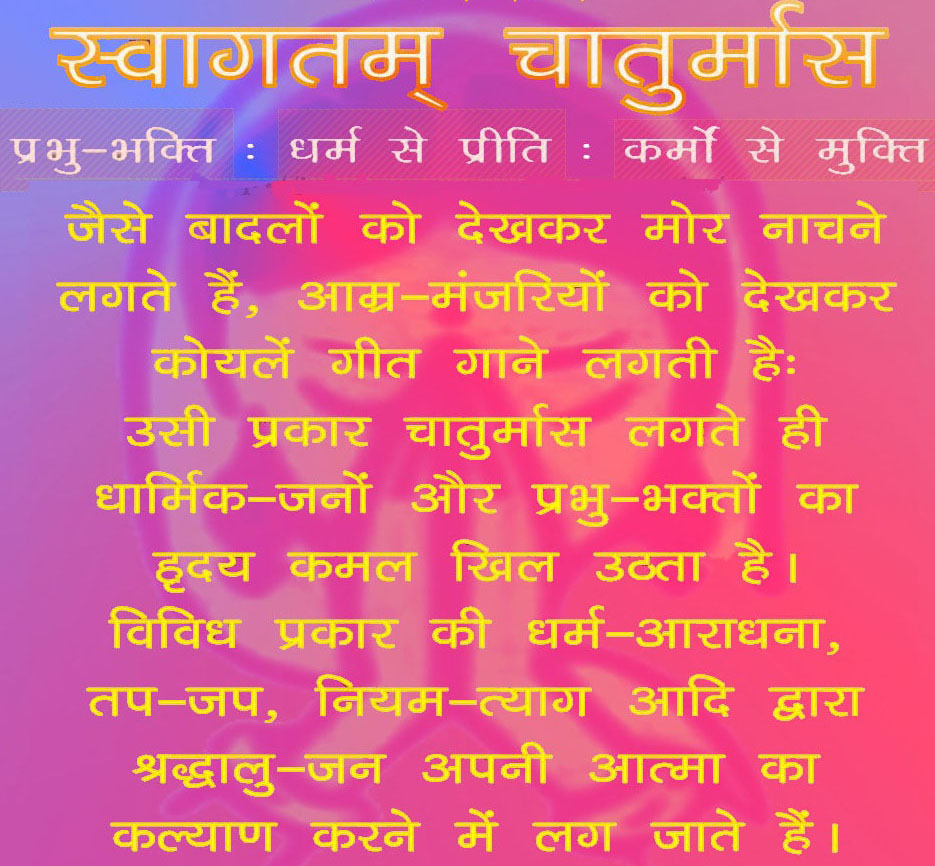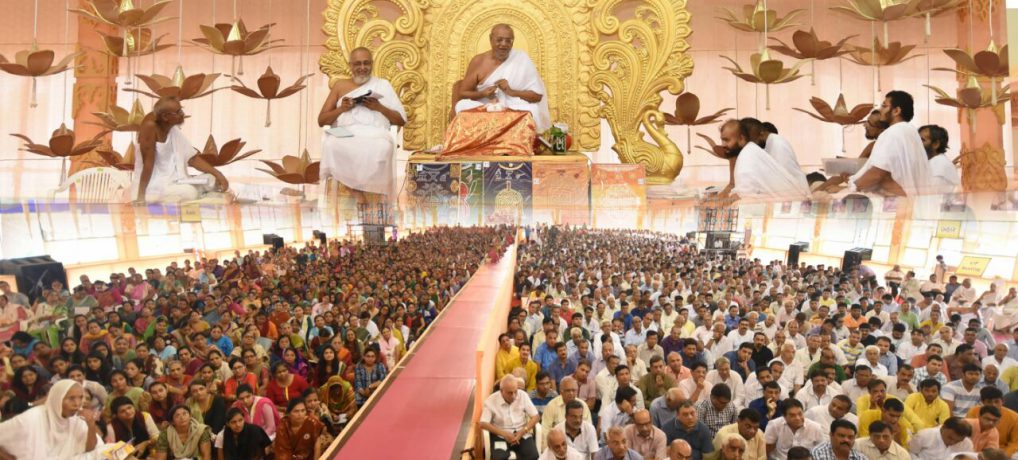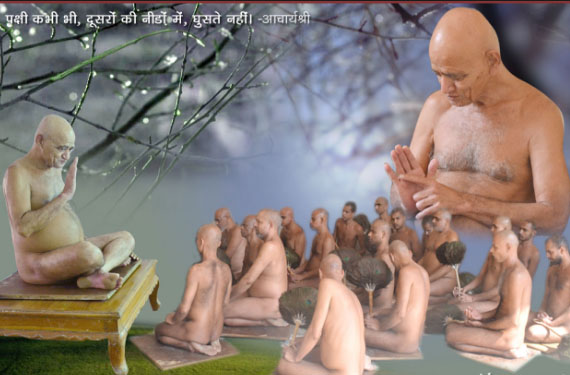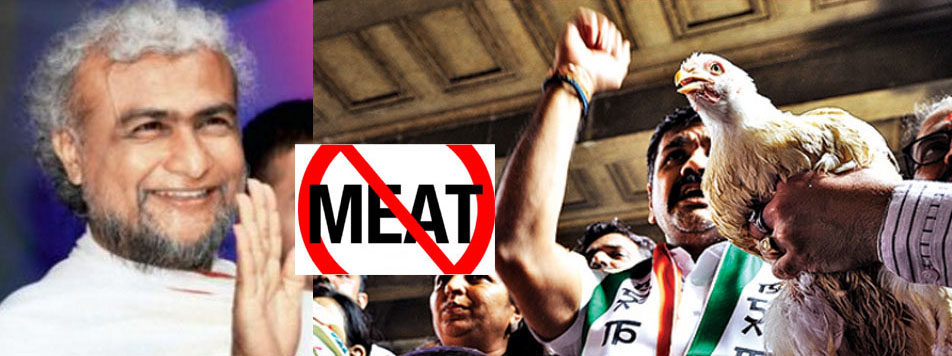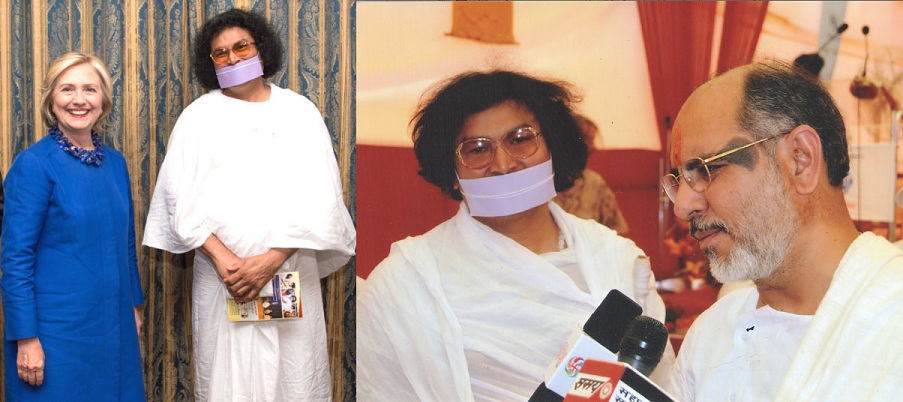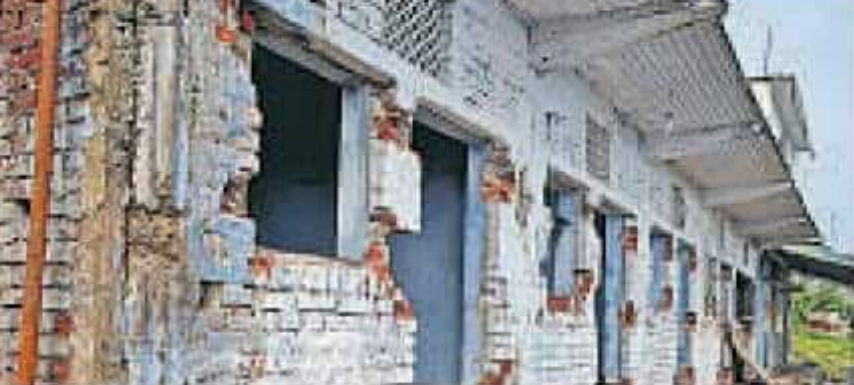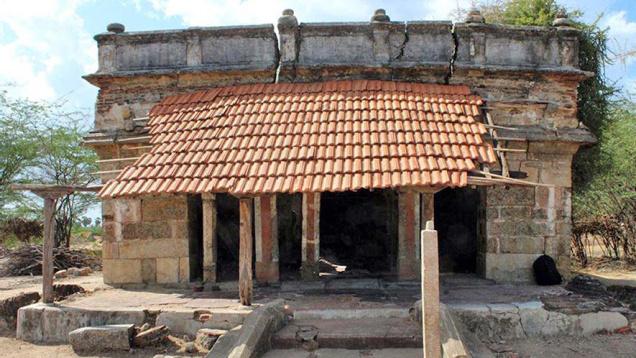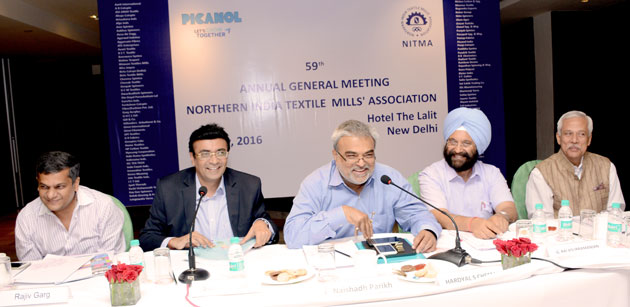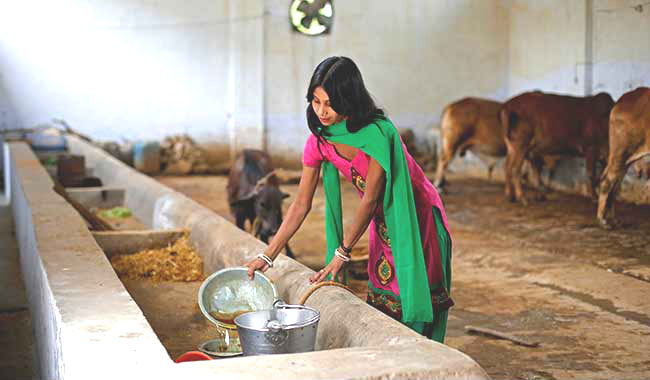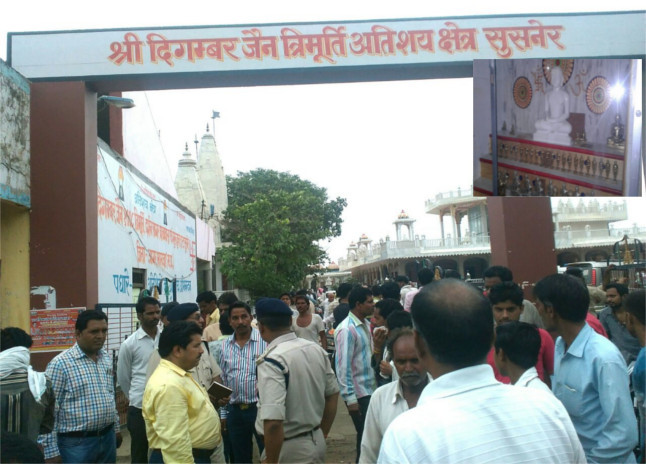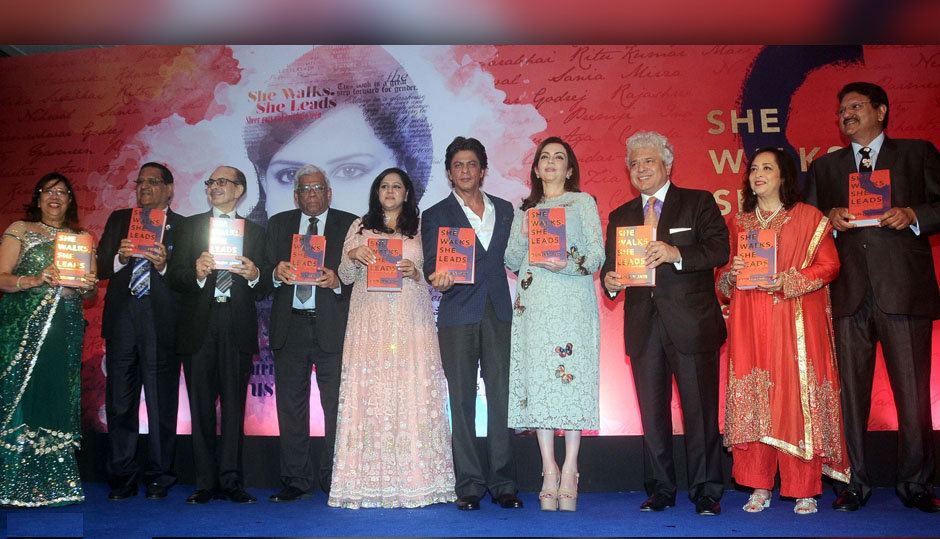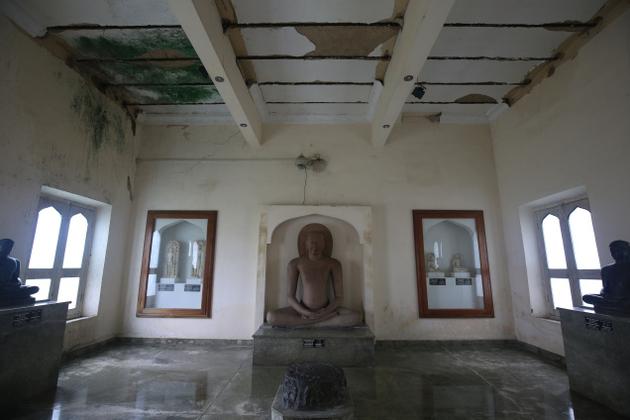|
CHATURMAS 2016 BEGINS
Chaturmas is a holy period of four months (July to October), beginning on Shayani Ekadashi the eleventh day of the first bright half, Shukla Paksha, of Ashadh (fourth month of the Hindu lunar calendar until Prabodhini Ekadashi, the eleventh day of the first bright half of Kartik (eighth month of the Hindu lunar calendar) in Hinduism, Buddhism and Jainism. Chaturmas is reserved for penance, austerities, fasting, bathing in holy rivers and religious observances for all. Devotees resolve to observe some form of vow, be it of silence or abstaining from a favourite food item, or having only a single meal in a day.
In Jainism this practice is collectively known as Varshayog and is prescribed for Jain monasticism. Wandering monks such as mendicants and ascetics in Jainism, believed that during the rain season, countless bugs, insects and tiny creatures that cannot be seen in the naked eye would be produced massively. Therefore, these monks reduce the amount of harm they do to other creatures so they opt to stay in a village for the four months to incur minimal harm to other lives. These monks, who generally do not stay in one place for long, observe their annual 'Rains Retreat' during this period, by living in one place during the entire period amidst lay people, observing a vow of silence, meditation, fasting and other austerities, and also giving religious discourses to the local public. During the four-month rainy-season period, when the mendicants must stay in one place, the saint give daily sermon, attended mostly by women and older, retired men, but on special days by most of the lay congregation. During their eight months of travel, the saint give sermons whenever requested, most often when they come to a new village or town in their travels.
One of the most important Jain festivals, Paryushana, falls during this period, which concludes with Forgiveness Day, Kshamavani Diwas, wherein lay people and disciples say Micchami Dukkadam and ask forgiveness from each other. Amongst Jain merchants, there is a tradition of inviting monks to their respective cities during Chaturmas to give religious instruction. In Jainism, the third part of the classical Jain text Kalpa Sutra, written by Bhadrabahu I in the 1st century AD, deals with rules for ascetics and laws during the four months (chaturmas) of the rainy season, when ascetics temporarily abandon their wandering life and settle down amidst the laity. This is the time when the festival of Paryushan is celebrated and the Kalpasutra is traditionally recited. Paryushana is an important Jain festival celebrated in the month of August or September. Normally Śvētāmbaras refer to it as Paryushana, while Digambaras refer it as Das Lakshana. Paryushana means "abiding, coming together". The duration of Paryusana is for eight days for Swetambar jains and ten days for jains belonging to the Digambara sect. Paryusana is a time when the laity take on vows of study and fasting with a spiritual intensity similar to temporary monasticism.
The date for the Paryushana festival is Bhadra shukla chaturthi. For this minimum duration, Paryushana must be initiated by panchami (the fifth day) of the shukla paksha phase of Bhadra. The last day is called Samvatsari, short for Samvatsari Pratikramana. Because of computational and other differences, there can be some minor differences among various sects. It comes at the time when the wandering monks take up temporary residence for the monsoon period or "cāturmāsa" "four-month". Because at this time the monks have settled in the town for a longer duration, it is time for the householders to have an annual renewal of the faith by listening to the statement of the Dharma and by meditation and vratas (self-control). Digambara Jains starting a 10-day period from Bhadra shukla panchami, during which the dashalakshana vrata is undertaken. Svetambara celebrate an eight-day festival that ends with Bhadrapada shukla chaturthi. It is believed that the devas do an eight-part worship of the tirthankaras, which takes eight days. Svetambara Jains celebrate this period as Paryushana.
During the 8-day festival, the Svetambaras Murtipujaki recite the Kalpa Sutra, which includes a recitation of the section on birth of Mahavira on the fifth day. Some Śvētāmbara Sthanakvasis recite the Antagada Sutra, which details the life of great men and women who attained moksha during the eras of Neminatha and Mahavira. The Digambara Jains recite the Tattvartha Sutra (compendium of Jain principles). On dashami, a sugandha-dashami vrata is made. Digambaras celebrate Ananta chaturdashi on which a special worship is done. Many towns have a procession leading to the main Jain temple. Anant Chaturdashi marks the day when Lord Vasupujya attained Moksh(nirvan).
On all the eight or ten days, Jains begin their day with pratikramana, or Jain meditation in the morning, followed by prayers for promoting universal peace and brotherhood. Pratikramana means turning back; also called samayika, the practitioner reflects on their spiritual journey and renews their faith. For both Svetambaras and Digambaras it takes the form of periodic meditation. The period can be twice daily, once every lunar phase, every four months or every year. The annual Pratikramana in some form is the minimum for the Sravaka and Sravikas. The annual pratikramana is called Samvatsari Pratikramana. Since it coincides with the end of Paryushana, the terms "Samvatsari" and "Paryushana" are sometimes used interchangeably. At the conclusion of the festival, the Sravakas request each other for forgiveness for all offenses committed during the last year. This occurs on the Paryusha day for the Swetambara and on Pratipada (first) of Ashwin Krashna for the Digambara. Forgiveness is asked by telling "Micchami Dukkadam" or "Uttam Kshama" to each other. It means "If I have caused you offence in any way, knowingly or unknowingly, in thought word or deed, then I seek your forgiveness"
400 YEARS AGO, JEHANGIR BANNED ANIMAL SLAUGHTER
|
At a time when meat ban has become an issue for a political slugfest in the country, a 400-year-old scroll from the Mughal era, preserved in the Lalbhai Dalpatbhai Museum in Ahmedabad, reveals how Emperor Jehangir had banned animal slaughter during Paryushan, a Jain festival. The first half of the document, about seven-feet in length, contains a pictorial depiction of deputation of Jains visiting Emperor Jehangir and securing a new imperial command or farmaan, under which the slaughter of animals was prohibited during the period of Paryushan. The second half contains a text written in Marwari language. Paryushan is a period of penance where Jains avoid any form of violence, including consumption of green vegetables. This valuable document containing the farmaan of Mughal Emperor was painted in the scroll form by Mughal court artist Ustad Salivahana in 1610 AD. The illustrated document was commissioned by the Jain community during that period. The scrolling order of the emperor is crafted with great thought and style. In the upper part of this colourful scroll, one can see the emperor seated on the balcony, while two Jain sadhus from Agra Vivekaharsha and Udayaharsha are seen carrying an application. The sadhus are being introduced by Raja Ramdasa, while Prince Khurram (third son of Jehangir who later came to be known as Shah Jahan) is standing on the left. In lower part of the order a court scene is depicted the proclamation of the farmaan in the bazaar and in the next part of the painted scroll, the two disciples of Vijayasena Suri (a Jain Acharya) presenting the farmaan to their Guru in the presence of other disciples. The document also contains an invitation to Vijayasena Suri, residing in Patan, Gujarat, to come and spend period of Paryushan in Agra.
JAIN SHWETAMBER MUNI CHATURMAS IN MUMBAI
|
1. Tapagachhadhipati Acharya Shri Premsurishwarji M. S., Pujya Acharyashri Kulchandrasurishwarji M. S., Akruti Aastha, 13Th Floor, Dungarshi Road, Walkeshwar, Mumbai-400006.
2. Gachhadhipati Acharya Shri Kirtisensurishwarji M. S., Panyas Shri Kirtidarshanji, Thakurdwar Road, Mumbai-400004.
3. Gachhadhipati Acharya Shri Kanakratnasurishwarji M. S., Aadinath Jinalay, 10th Road, Chembur, Mumbai-400071.
4. Pujya Acharya Shri Kalyansagarsurishwarji M. S. Vasupujya Swami Jinalay, Mamlatdar Wadi, Malad (W), Mumbai-400064.
5. Pujya Acharya Shri Rajendrasurishwarji M. S. Chintamani Parshwanath Jain Sangh, Sanghani Estate, Ghatkoper (W), Mumbai-400086.
6. Pujya Acharya Shri Varbodhisurishwarji M. S. Munisuvrat Swami Jain Sangh, Juhu Scheme, Vile Parle (W) Mumbai-400057.
7. Pujya Acharya Shri Kulbodhisurishwarji M. S. Sankheshwar Parshwanath Jain Sangh, 60 Feet Road, Ghatkoper (E), Mumbai-400077.
8. Pujya Acharya Shri Ajitshekharsurishwarji M. S. Sambhavnath Jain Derasar, Jambli Galli, Borivali (W), Mumbai-400092.
9. Pujya Acharya Shri Sagarchandrasurishwarji M. S., Aadishwar Jinalay, Babu Pannalal Upashray, Ridge Road, Walkeshwar Mumbai-400006.
10. Pujya Acharya Shri Rajratnasurishwarji M. S., Jawahar Nagar Jain Sangh, Jawahar Nagar, Goregaon (W), Mumbai-400062.
11. Pujya Acharya Shri Rajtilaksurishwarji M. S. Vasupujya Swami Jinalay, M. G. Road, Goregaon (W), Mumbai-400062.
12. Pujya Acharya Shri Meghdarshansurishwarji M. S., Chandraprabhuswami Jinalay, Vadilal Sarabhai Upashray, R. R. Road, Prarthna Samaj, Mumbai-400004.
13. Pujya Acharya Shri Kalapurvasurishwarji M. S., Sankheshwar Parshwanath Jinalay, Old Nagardas Road, Andheri (E), Mumbai-400069.
14. Pujya Acharya Shri Kanakshekharsurishwarji M. S. Chandanbala, R. R. Thakkar Marg, Walkeshwar, Mumbai-400006.
15. Pujya Acharya Shri Naivardhansurishwarji M. S. Shripal Nagar, J. Mehta Road, Nepeansea Road, Walkeshwar, Mumbai-400006.
16. Pujya Acharya Shri Naichandrasagarsurishwarji M. S. Abhinandanswami Jinalay Upashray, Sion Society, Sion, Mumbai-400022.
17. Pujya Acharya Shri Jinatmasurishwarji M. S., Motisha Jain Derasar, Love Lane, Byculla Mumbai-400011.
18. Pujya Acharya Shri Hemchandrasurishwarji M. S. Chintamani Parshwanath Jinalay, M. G. Road, Vile Parle (E) Mumbai-400057.
19. Pujya Acharya Shri Ravidevsurishwarji M. S. Dahelawala, Rajasthan Jain Sangh, Aarey Road, Goregaon (W), Mumbai-400062.
20. Pujya Acharya Shri Yashovarmasurishwarji M. S. Munisuvrat Swami Tembhi Naka, Thana, Dist. Thana-400601.
21. Pujya Acharya Shri Nandighoshsurishwarji M. S. Aadinath Jinalay, 10Th Road, Chembur, Mumbai-400071.
22. Pujya Acharya Shri Tirthbhadrasurishwarji M. S. Shantinath Jinalay Upashray, Jitendra Road, Malad (E), Mumbai-400097.
23. Pujya Acharya Shri Rajshekharsurishwarji M. S., Godiji Jain Derasar, Vallabh Chowk, Kika Street, Mumbai-400004.
24. Pujya Acharya Shri Chandranandsagarsurishwarji M. S. Sarvoday Nagar, Sarvoday Parshwanath Jinalay, Mulund (W), Mumbai-400080.
25. Pujya Acharya Shri Naychandrasagarsurishwarji M. S. (Shatavadhani), Abhinandanswami Jinalay Upashray, Sion Society, Sion, Mumbai-400022.
26. Pujya Panyas Shri Indrayashvijayji M. S., Neminath Jain Sangh, Gokul Nagar, Bhiwandi, Dist. Thana-421308.
27. Pujya Panyas Shri Manobhushanvijayji M. S. Vardhman Bhakti Swe. Mu. Jain Sangh, Irani Wadi, Shanti Lal Modi Road, Kandivali (W), Mumbai-400067.
28. Pujya Panyas Shri Arijitvijayji M. S., Devnagar Jain Sangh, Kandivali (W), Mumbai-400067.
29. Pujya Panyas Shri Gunchandrasagarji M. S., Aadishwar Jain Temple, Ambedkar Road, Parel, Central, Mumbai-400012.
30. Pujya Panyas Shri Arihantsagarji M. S., Pawapuri Jain Sangh, Kandivali (E) Mumbai-400101.
31. Pujya Panyas Shri Hansratnavijayji M. S., Chandraprabhuswami Jinalay, Vile Parle (W), Mumbai-400057.
32. Pujya Panyas Shri Vidhyanandvijayji M. S., Piyushpani Tirth, Ghodbandar Road, Dist. Thana-400607.
33. Pujya Ganivarya Shri Darshansagarvijayji M. S., Shantinath Zalawad Jain Sangh, A. C. Road, Kandivali (E), Mumbai-400101.
34. Pujya Panyas Shri Dharmadarshanvijayji M. S., Ratnapuri Jain Sangh, Gaushala Lane, Malad (E), Mumbai-400097.
35. Pujya Panyas Shri Naybhadravijayji M. S., Mahavir Swami Jinalay, Sodawala Lane, Borivali (W), Mumbai-400092.
36. Pujya Panyas Shri Yugbhadravijayji M. S., Tribhuvan Tarak Jain Sangh, Near Bhadrakali Temple, Bhayandar (W), Dist. Thana-401101.
37. Pujya Ganivaryashri Muktipranthvijayji M. S., Dhanji Wadi Jain Sangh, Dhanji Wadi, Kedarmal Road, Malad (E), Mumbai-400097.
38. Pujya Ganivaryashri Sanyamprabhvijayji M. S., Rushabh Tower, Byculla Mumbai-400011.
39. Pujya Ganivaryashri Arhamprabhvijayji M. S., Vadala Jain Sangh, Rafi Ahmed Kidwai Road, Vadala, Mumbai-400031.
40. Pujya Ganivaryashri Bhavyachandravijayji M. S., Kumud Mansion, Forjet Hill Road, Tardeo, Mumbai-400007.
41. Pujya Ganivaryashri Hitratnavijayji M. S., Plot No. 40, Jawahar Nagar, Goregaon (W), Mumbai-400062.
42. Pujya Ganivaryashri Rimkarvijayji M. S., Mahavir Nagar, Dahanukar Wadi, Kandivali (W), Mumbai-400067.
43. Pujya Ganivaryashri Naypadmasagarji M. S., Vidhan Park, Curry Road, Mumbai-400012.
44. Pujya Panditji Panyas Kalpbhushan Vijayji M. S., Gitanjali Nagar, Sankheshwar Parshwanath Jinalay, Saibaba Nagar, Borivali (W), Mumbai-400092.
45. Pujya Panyas Shri Tatvadarshanvijayji M. S. Aradhna Bhuvan, August Kranti Marg, Gowalia Tank, Mumbai-400036
46. Surilabdhisgar Vijayji M. S., Suparshwanath Jinalay, 101, Walkeshwar Mumbai-400006.
47. Pujya Pujya Munirajshri Anmolratnavijayji M. S., Aadeshwar Jinalay, Sonawala Estate, Tardeo, Mumbai-400007
48. Param Pujya Devkirtivijayji M. S., Dipakjyot Tower Jain Sangh, Dipak Jyot Tower, Parel, Mumbai-400012
49. Pujya Munirajshri Paramyashvijayji M. S., Borivali West Swe. Murtipujak Jain Sangh, Mandepshwar Road, Borivali (W), Mumbai-400092
50. Pujya Munirajshri Jagatshekharvijayji M. S., Mulund Jain Sangh, Zaver Road, Mulund (W), Mumbai-400080.
51. Pujya Munirajshri Hridayratnavijayji M. S., Shreyanskar Bhakti Swe. Mu. Jain Sangh, Pandurangwadi, Dombivali, Mumbai-421201
52. Pujya Munirajshri Yugratnavijayji M. S., Shri Shreyaskar Andheri Gujarat Jain Sangh, Irla, Vile Parle (W), Mumbai-400057
53. Pujya Munirajshri Omkarshekharvijayji M. S., Mahavir Nagar, Dahanukar Wadi, Kandivali (W), Mumbai-400067
54. Pujya Munirajshri Krupashekharvijayji M. S., Aradhna Bhuvan, Dadar (W), Mumbai-400028
55. Pujya Munirajshri Jinratnavijayji M. S. Dahelawala, Kunthunathswami Jinalay, Derasar Marg, Santacruz (W), Mumbai-400054
56. Pujya Munirajshri Indrajitvijayji M. S. (Vallabhisuri), Mahavirnagar S. M. Jain Sangh, Shankar Lane, Kandivali (W), Mumbai-400067
57. Pujya Munirajshri Viraktsagarji M. S. (Vallabhisuri), Shantinath Jinalay, Bazar Gate Street, Fort, Mumbai-400001
58. Pujya Munirajshri Prashamratnavijayji M. S. Shri Chandraprabhuswami Jinalay, Shanta Wadi, Andheri (W), Mumbai-400053
59. Pujya Munirajshri Nipunchandrasagarji M. S., Gundecha Garden, Lalbaug Mumbai-400012.
60. Pujya Munirajshri Abhinandansagarji M. S., Navjivan Society, Lamington Road, Mumbai-400004.
61. Pujya Munirajshri Netrachandvijayji M. S., Ghelabhai Senatorium, Vile Parle (W), Mumbai-400057.
62. Pujya Munirajshri Vishwanandvijayji M. S., Kandivali West S. M. Jain Sangh, Munisuvratswami Jinalay, Bhulabai Road, Parekh Galli Corner, Kandivali (W), Mumbai-400067.
63. Pujya Munirajshri Rashmiratnavijayji M. S., Bavan Jinalay, Devchand Nagar, Bhayandar (W), Dist. Thana-401101.
64. Pujya Munirajshri Aagamratnavijayji M. S., Devchand Nagar, Haji Bapu Road (W), Malad (E), Mumbai-400097.
65. Pujya Munirajshri Ratnavijayji M. S., Sankheshwar Parshwanath Jain Sangh, Daulat Nagar Road No. 7, Borivali (E), Mumbai-400066.
66. Pujya Munirajshri Ramvijayji M. S. (Laghushraman), Vasupujya Swami Jinalay, Mamlatdar Wadi, Malad (W), Mumbai-400064.
67. Pujya Munirajshri Punyaratnavijayji M. S., Motisha Road, Jain Upashray, Madhubag, Lalbaug, Mumbai-400012.
68. Pujya Munirajshri Punyaratnavijayji M. S., Gnan Mandir, Gnan Mandir Road, Dadar (W), Mumbai-400028.
69. Pujya Munirajshri Gandharratnavijayji M. S., Jain Mandir Road, Sambhavnath Jinalay, Hill Road, Bandra (W), Mumbai-400050.
70. Pujya Munirajshri Nirmalbodhi M. S., Vina Nagar, Lbs Road, Mulund (W), Mumbai-400080.
71. Pujya Munirajshri Dharmaratnavijayji M. S., Ram Nagar, Mulund (W), Mumbai-400080.
72. Pujya Munirajshri Nigranthvijayji M. S., Jayna Mangal Wadi, Bhiwandi, Dist. Thana-421308.
73. Pujya Munirajshri Tirthdhyanvijayji M. S., Devkaran M. S., Devkaran Mulji Kalyan Parshwanth Jinalay, Anand Road, Malad (W), Mumbai-400064.
74. Pujya Munirajshri Viraktsagarji M. S., Jivanji Abji Upashray, Near Arora Cinema, Kings Circle, Mumbai-400019.
75. Pujya Munirajshri Tirthpurnavijayji M. S., Adarsh Riddhi Siddhi Parshwanath Jain Sangh, Marve Road, Malad (W), Mumbai-400064.
76. Pujya Munirajshri Vidhyachandravijayji M. S., A-101/102,Om Sagar, Opp. Upashray, Opp Kotak Mahindra Bank, Chandavarkar Road, Borivali (W), Mumbai-400092.
77. Pujya Munirajshri Bhuvan Harshvijayji M. S., Shantinath Jinalay, Bhavani Shankar Road, Opp Kabutar Khana, Dadar (W).
ACHARYA VIDHYA SAGAR JI WITNESSES MP ASSEMBLY PROCEEDINGS
|
29th July, 2016, Bhopal: Education should be provided in the local language. English is also a good language, but teaching should be given in mother tongue, said Acharya Vidhya Sagar Maharaj on MP State Assembly premises while addressing the MLAs ando fficers. The Acharaya, along with 28 other saints, also witnessed the assembly proceedings. He added that Education and the health should not become a business. He said that in the world many countries are prosperous, but democracy is prospering in India. Brave hearts have laid down their lives to establish peace and their sacrifice should be remembered, said, adding that people do not know their history. Chief minister Shivraj Singh Chauhan, Speaker Sitasharan Sharma and other MLAs welcomed the Acharya and the Muni Sangh. CM also recited shlokas and praised the Acharya. He said. I also am trying to become Jain. He added that the government has established the Anand Mantralaya, but money did not bring happiness in life.
DIGAMBER JAIN MUNI CHATURMAS
|
1. Chandigarh
1. Muni Shri 108 Tarunsagarji Maharaj
2. Chhattisgarh
1. Vaishali Nagar Bhilai - Acharya Shri 108 Vishuddha Sagarji Maharaj
3. Delhi
1. Bahubali Enclave - Acharya Shri 108 Shrut Sagarji Maharaj
2. Bholanath Nagar, Shahdara - Upadhyaya Shri 108 Nayan Sagarji Maharaj
3. Dharampura, Chandni Chowk - Ganini Aryika Shri 105 Saraswati Mataji
4. Dhyan Teerth, Ghitorni - Acharya Shri 108 Aanand Sagarji Maharaj
5. Kailash Nagar Shahdara - Acharya Shri 108 Vibhakt Sagarji Maharaj
6. Kund Kund Bharti - Acharya Shri 108 Vidyanandji Maharaj
7. Nangli Dairy - Kshullak Shri 105 Yogbhushanji Maharaj
8. Pahari Dhiraj - Elacharya Shri 108 Pragy Sagarji Maharaj
9. Preet Vihar - Upadhyaya Shri 108 Gupti Sagarji Maharaj
10. Raja Bazaar, Connaught Place - Ganini Aryika Shri 105 Chandramati Mataji
11. Rohini, Sector 11- Bal Muni Shri 108 Saurabh Sagarji Maharaj
12. Shakti Nagar - Kshullika Shri Bhaktibhushanji & Kshullika Shri Pujabhushanji
13. Shalimar Bagh - Muni Shri 108 Anuman Sagarji Maharaj
14. Vijay Vihar Uttam Nagar - Muni Shri 108 Sankalpbhushanji Maharaj
15. Vivek Vihar - Elacharya Shri 108 Ativeerji Maharaj
4. Gujarat
1. Bediya - Acharya Shri 108 Jay Sagarji Maharaj
2. Devpuri, Digamber Jain Atishay Kshetra Derol - Acharya Shri 108 Rayan Sagarji Maharaj
3. Nirmal Dhyan Kendra, Junagadh - Acharya Shri 108 Nirmal Sagarji Maharaj
4. Omkar Tirth Vadodara - Acharya Shri 108 Surya Sagarji Maharaj
5. Umta Gujarat - Acharya Shri 108 Nirbhay Sagarji Maharaj
5. Jharkhand
1. Shikharji Parasnath Hill - Acharya Shri 108 Sambhav Sagarji Maharaj
2. Shikharji, Parasnath Hill - Ganini Aryika Shri 105 Gurunandani Mataji
6. Karnataka
1. Bangalore - Muni Shri 108 Prasanna Sagarji Maharaj
2. Bannerghatta Biological Park, Bengaluru - Muni Shri 108 Chinmay Sagarji Maharaj
3. Belgaum - Bal Acharya Shri 108 Siddhasenji Maharaj
4. Shravanabelagola - Acharya Shri 108 Chandraprabhu Sagarji Maharaj
5. Varur - Acharya Shri 108 Gundharnandiji Maharaj
7. Madhya Pradesh
1. Bela - Acharya Shri 108 Siddhant Sagarji Maharaj
2. Bhind - Acharya Shri 108 Virag Sagarji Maharaj (Anklikar)
3. Chhatarpur - Muni Shri 108 Pavitra Sagarji Maharaj
4. Chindwara - Muni Shri 108 Anupam Sagarji Maharaj
5. Chindwara - Muni Shri 108 Suprabh Sagarji Maharaj
6. Darguwan Tikamgarh - Acharya Shri 108 Vinishchay Sagarji Maharaj
7. Devendra Nagar - Acharya Shri 108 Vimarsh Sagarji Maharaj
8. Golakot - Muni Shri 108 Saral Sagarji Maharaj
9. Habib Ganj, Bhopal - Acharya Shri 108 Vidya Sagarji Maharaj
10. Indore - Acharya Shri 108 Shiv Sagarji Maharaj
11. Jaora - Muni Shri 108 Prabhav Sagarji Maharaj
12. Khategaon - Muni Shri 108 Arah Sagarji Maharaj
13. Mehgaon - Muni Shri 108 Manogya Sagarji Maharaj
14. Pushpgiri Tirth, Dewas - Acharya Shri 108 Pushpadant Sagarji Maharaj
15. Sonagiri Jain Hill Temples Sewni - Muni Shri 108 Sudharma Sagarji Maharaj
16. Ujjain - Ganini Aryika Shri 105 Kshamashri Mataji
17. Vidisha - Muni Shri 108 Svabhav Sagarji Maharaj
8. Maharashtra
1. Bori - Muni Shri 108 Aagya Sagarji Maharaj
2. Borivali - Acharya Shri 108 Padamnandiji Maharaj
3. Gajpanth Jain Siddhakshetra, Nashik - Ganini Aryika Shri 105 Shubhmati Mataji
4. Kundal, Sangli - Ganini Aryika Shri 105 Jindevi Mataji
5. Kunthugiri Shree Kshetra Jain Tempal Kolhapur - Acharya Shri 108 Kunthu Sagarji Maharaj
6. Mangi Tungi - Elacharya Shri 108 Nijanandji Maharaj, Muni Shri 108 Prabal Sagarji Maharaj
7. Mangi Tungi - Acharya Shri 108 Anekant Sagarji Maharaj
8. Miraj - Acharya Shri 108 Nemi Sagarji Maharaj
9. Mumbai - Muni Shri 108 Pulak Sagarji Maharaj
10. Nagpur - Muni Shri 108 Prateek Sagarji Maharaj
11. Natepute - Upadhyaya Shri 108 Niyam Sagarji Maharaj
12. Raja Bazar, Aurangabad - Acharya Shri 108 Guptinandiji Maharaj
13. Sakinaka - Muni Shri 108 Amarkirtiji Maharaj
14. Shukravar Peth Tuljapur - Acharya Shri 108 Vidyanandiji Maharaj
15. Solapur - Acharya Shri 108 Vipul Sagarji Maharaj
16. Thane - Acharya Shri 108 Kushagra Nandiji Maharaj
17. Udgir - Upadhyaya Shri 108 Mayank Sagarji Maharaj
9. Rajasthan
1. Ajmer - Muni Shri 108 Praman Sagarji Maharaj, Muni Shri 108 Viratsagarji Maharaj
2. Anjana High School, Banswara - Muni Shri 108 Aagam Sagarji Maharaj
3. Bagidora - Muni Shri 108 Aanand Sagarji Maharaj, Muni Shri 108 Dheer Sagarji Maharaj
4. Bahubali Colony Banswara - Acharya Shri 108 Sunil Sagarji Maharaj (Anklikar)
5. Barkhera - Acharya Shri 108 Vasunandiji Maharaj
6. Beawar - Muni Shri 108 Maha Sagarji Maharaj, Muni Shri 108 Nishkamp Sagarji Maharaj
7. Behroj - Muni Shri 108 Pawan Sagarji Maharaj
8. Dahmi Kalan - Acharya Shri 108 Naveen Sagarji Maharaj
9. Devli - Aryika Shri 105 Vijaymati Mataji
10. Dungarpur - Ganini Aryika Shri 105 Suprakashmati Mataji
11. Hiran Magri Udaipur - Acharya Shri 108 Vimad Sagarji Maharaj
12. Jaipur - Muni Shri 108 Pragya Sagarji Maharaj
13. Jodhpur - Elacharya Shri 108 Vibudh Sagarji Maharaj
14. Kekri - Ganini Aryika Shri 105 Vishashri Mataji
15. Kesariyaji Tirth Rishabhdev - Upadhyaya Shri 108 Urjayant Sagarji Maharaj
16. Malpura - Ganini Aryika Shri 105 Vigyashri Mataji
17. Nagda Bazar Salumbar - Acharya Shri 108 Vairagyanandiji Maharaj
18. Nasirabad - Muni Shri 108 Uttam Sagarji Maharaj, Kshullak Shri 105 Suparshva Sagarji Maharaj
19. Nava - Acharya Shri 108 Sukumalnandiji Maharaj
20. Niwai - Ganini Aryika Shri 105 Vishuddhamati Mataji (Lashkar)
21. Padampura - Acharya Shri 108 Shashank Sagarji Maharaj
22. Phagi - Acharya Shri 108 Chandra Sagarji Maharaj
23. Sagwara - Acharya Shri 108 Samta Sagarji Maharaj
24. Shri Mahaveerji Banwaripur - Acharya Shri 108 Vimal Sagarji Maharaj
25. Sipur, Udaipur - Acharya Shri 108 Kanaknandiji Maharaj
26. Tonk - Acharya Shri 108 Vishad Sagarji Maharaj
27. Udaipur - Upadhyaya Shri 108 Anubhav Sagarji Maharaj
28. Vigyan Nagar, Kota - Ganini Aryika Shri 105 Sangammati Mataji
29. Vimal Vilas, Sanganer Jaipur - Acharya Shri 108 Sudharma Sagarji Maharaj
10. Telangana
1. Aghapura Telangana - Muni Shri 108 Pramukh Sagarji Maharaj
11. Uttar Pradesh
1. Agra - Acharya Shri 108 Surya Sagarji Maharaj (Argakar)
2. Barabanki - Ganini Aryika Shri 105 Vimalprabha Mataji
3. Baraut - Muni Shri 108 Viharsh Sagarji Maharaj
4. Chambal River Etawah - Acharya Shri 108 Saubhagyasagarji Maharaj
5. Chandra Nagar, Saharanpur - Muni Shri 108 Anuj Sagarji Maharaj
6. Firozabad - Acharya Shri 108 Vinamra Sagarji Maharaj
7. Hastinapur - Kshullak Shri 105 Dhyan Sagarji Maharaj
8. Jhansi - Aryika Shri 105 Vivaktshri Mataji
9. Kaman - Acharya Shri 108 Gunbhushanji Maharaj
10. Kavi Nagar, Ghaziabad - Ganini Aryika Shri 105 Shrutdevi Mataji
11. Khatauli - Elacharya Shri 108 Kshama Bhushanji Maharaj
12. Kohdar - Muni Shri 108 Daya Rishiji Maharaj
13. Mandola - Elak Shri 105 Vigyan Sagarji Maharaj
14. Mohiuddinpur - Acharya Shri 108 Gyanbhushanji Maharaj
15. Nai Mandi Gaushala, Muzaffarnagar - Acharya Shri 108 Bharatbhushanji Maharaj
16. Noida - Elacharya Shri 108 Trilokbhushanji Maharaj
17. Tajganj Agra - Muni Shri 108 Vigyanbhushanji Maharaj
18. Trilok Teerth Dham Badagaon - Muni Shri 108 Swarbhushanji Maharaj
12. Uttarakhand
1. Dehradun - Kshullak Shri 105 Samarpan Sagarji Maharaj
13. West Bengal
1. Kolkata - Acharya Shri 108 Chaitya Sagarji Maharaj
MEXICAN TANIA MAYNEZ BECOMES JAIN SADHVI ANUBHUTI IN US
|
It is a special occasion when a soul particularly, on foreign land decides to enter the monastic life and become a Jain Sadhvi. Tania Maynez, 33 was accorded diksha by Acharya Shree Yogeesh. Diksha is the ceremony of initiation into monkshood. Tania Maynez, 33, was born in Mexico to a hard-working family who instilled in her the values of integrity and compassion. At the age of 12, she moved with her family to Houston, Texas. She graduated from the University of Houston with Cum Laude honors and a Bachelor of Business Administration in Marketing degree, a Minor in French, After studying and practicing the teachings for over a year at home, traveling to Nepal with her guru, and visiting Siddhayatan Tirth on a monthly basis, she gained more clarity and received her souls calling. Tania expressed her desire to become a Sadhvi under Acharya Shree Yogeesh and at the same time he accepted her for training. In February 2013, Tania moved to Siddhayatan Tirth to begin her Sadhvi training.
Since moving and training at Siddhayatan Tirth for 3 years, she completed her studies of the Dashvaikalik and Uttradhyan sutras, learned how to read, write and speak basic Hindi. In April of this year, she organized four successful events in Mexico where nearly 200 people had the opportunity to meet Acharya Shree Yogeesh and be introduced to the teachings of Tirthankara Mahavira, nonviolence, vegetarianism and the Shramanic teachings for the first time. It was the first time in Mexicos history a Jain Acharya and Sadhvi visited. Tania wishes to dedicate her life to spreading the teachings of the Tirthankaras worldwide. Tanias diksha was a two-day event on July 8th and 9th, 2016. The diksha festivities began in McKinney, Texas at a Jain family's home for an evening of mehndi rasma, bhajans, and bhavana. The following day, the local Jain, Hindu, and Siddhayatan Spiritual community came together at Siddhayatan Tirth to witness a historic moment. She is the first Mexican to take Jain Sadhvi Diksha.
In his address at ceremony, Acharya Shree said, "The diksha Tania is about to take is not an easy one. It takes a brave and courageous soul to leave the world and family behind. The vow she takes today is forever. Many think they can take this step and many desire spiritual monk life, but it is rare for someone to actually make the leap. I give a lot of credit to her. She has trained and worked hard on herself for three years. She left a successful life. She left her family. She is ready to endure the path of a Sadhvi. She is dedicating her life to find freedom. You must know, in order to share freedom, you must first have it yourself. It's not easy an easy thing to achieve, but it is not impossible. She will reach her goal one day. My question to all of you is, if she can renounce the whole world today, can you at least renounce one thing in your life that is causing harm to yourself or others?" He also stressed the importance of gender equality and that both women and men can achieve moksha-enlightenment and liberation--if they free themselves from karma and the cycle of birth and death. According to Acharya Shree, "Diksha is the first step towards liberation." As a newly initiated Sadhvi, Sadhvi Anubhuti delivered a inspiring speech. She first began by sharing a poem she wrote titled, "Let It Be." A few lines from her poem.
¦ If Im going to have courage, Let it be courage to face the challenges of the path.
If Im going to feel pain, Let it be the pain of burning karma.
If Im going to judge, Let it be to judge my intentions.
If Im going to work, Let it be to work on myself.
And if Im going to move, Let it be to move towards eternal freedom.
After her poem, she expressed, With Acharya Shrees blessing and guidance I wish for my soul to achieve four things.
I would like to serve humanity and help those in need. With so many blessings in my life, I cannot turn my back against those living in fear, pain, and suffering. I would like to spread Acharya Shree's teachings and the teachings of the Tirthankaras because I know that this will help pave a road for those souls seeking liberation. I wish for my soul to inspire others to work on themselves, to find themselves, and to find the incredible things Ive discovered through spirituality.
And last, I wish for my soul to reach its highest potential in this life. Sadhvi Anubhuti concluded, If I live my life like this, then I will know that I lived a meaningful life. And if at least one person becomes inspired to do the same, then I will know that absolutely everything was worth it.
MUMBAI DABBAWALAS SUPPORT SHRIMAD RAJCHANDRA ORGAN DONATION PROGRAMME
|
A small act of selfless service can inspire the collective conscience of thousands of people and transform the lives of many in the future. This was the story of Deyaan Udani, a 7 year old boy from Sydney, Australia. Deyaan was deeply inspired by his Spiritual Master Pujya Gurudevshri Rakeshbhai's (Founder of Shrimad Rajchandra Mission Dharampur) message of serving selflessly.
Deyaan had once mentioned to his parents of his wish to be an Organ Donor. On a trip to India, Deyaan's health deteriorated suddenly and he left his mortal body in an untimely death! However, his death gave a new lease of life to 4 people and vision to 2. Deyaan's parents Mili and Rupesh Udani stood resilient even in times of immense grief and fulfilled his wish. In his untimely death, Deyaan lit the lamp of hope for many in the times to come.
What started as an individual contribution soon evolved into a mass movement called the Shrimad Rajchandra Organ Donation Programme, a public awareness campaign to encourage and promote organ donation after death, launched by Shrimad Rajchandra Love and Care, an NGO that Deyaan was inspired by and committed to. This programme aims to bring about a positive change to the current transplant scenario by inspiring people to pledge for organ donation after death and bridge the huge gap between need and availability of organs!
The programme was launched by Pujya Gurudevshri Rakeshbhai on Valentine's Day in memory of little Deyaan and was attended by several dignitaries like Smt. Snehal Ambekar, Mayor of Mumbai; Shri Subhash Ghai, leading Filmmaker; Dr. Aditi Gowitrikar, Actress and Model; Shri Manoj Lohiya, Additional Commissioner of Police (Central Region); Shri Raosaheb Shinde, Additional Commissioner of Police (Eastern Region) and Dr. Bharat Shah, Nephrologist and founder of Narmada Kidney Foundation. The launch saw over 3000 individuals, including Pujya Gurudevshri Rakeshbhai and the dignitaries, sign the pledge forms in just few minutes, thereby giving a loving tribute to Deyaan who became an instrument in igniting this global movement.
The famous dabbawalas of Mumbai supported the Shrimad Rajchandra Organ Donation Programme and spread the message of this cause on the occasion of Organ Donation Day to the people of Mumbai. Sporting their trademark white cotton kurta-pyjamas and the white Gandhi topis, this enthusiastic group carried an organ donation card in each of over 2, 00,000 tiffins they deliver across the length and breadth of Mumbai each day. This is perhaps the largest ever single day reach that the programme has garnered since launch and the dabbawalas played a stellar role in promoting this humanitarian cause, with fervour and enthusiasm. Their accuracy in delivering tiffins is a folk-lore in Mumbai; however by promoting a cause as important as organ donation, they have added another feather to their cap of serving people selflessly.
Shrimad Rajchandra Organ Donation Programme aims at creating awareness and gaining support from across the world, so that numerous people may live a better life, a new life.
A single organ donor can save up to 8 lives and save or improve the lives of up to 50 people by donating tissues and eyes. Any individual can donate skin and eyes for which the necessary procedures have to be performed within 6 hours. In a brain dead individual, the heart can continue to function on a ventilator and other support for a maximum of 36 to 72 hours. As the blood supply to organs can be maintained for a few hours, it is during this period that all suitable organs such as kidneys, liver, heart, lungs, pancreas, etc. can be retrieved.
One can join this initiative by registering as an organ donor at www.srloyeandcare.oreorgan-donation. You can spread awareness of this initiative and inspire people in your community to be a part of this noble cause.
JAIN MONK NAYPADMASAGARJI MAHARAJBILLS 2017 MUMBAI CIVIC POLL AS VEG VS NON-VEG
|
5th August 2016: Mumbai: Naypadmasagarji Maharaj a Jain monk has billed the 2017 BMC elections as a contest between vegetarians and non-vegetarians and declared that only those candidates who promise to shut the city's slaughter houses on eight specific days in a year will get the community's 18 lakh votes. Naypadmasagarji Maharaj Maharaj, who has a large following in the community in the city and across the world, has been mentioning the BMC elections in nearly all his sermons and urging the community to use the polls to build pressure on their representatives to help shut slaughter houses on certain days of the year. The list of the days when he wants no animal slaughtered in the city is rather exhaustive-two days of Paryushan, Good Friday, Gandhi Jayanti, Ambedkar Jayanti, Mahavir Jayanti, the Independence Day and the Republic Day. Naypadmasagarji Maharaj, founder of the Jain International Organisation that brings together community members from all four sects Shwetambar, Digambar, Terapanthi and Stanakvasi has said that he has already communicated his demand to Chief Minister Devendra Fadnavis. "The community's sentiments were hurt last year when the shutdown of slaughters houses on two Paryushan days was lifted. We cannot let that happen again. It is a very sensitive matter for us," he said, adding that he has raised the matter with former Congress MP Milind Deora and Shiv Sena and BJP leaders.
In 2015, the controversial lifting of eight-day shutdown of slaughter houses in the BJP-ruled Mira Bhayander Municipal Corporation had led to a furore in the community. The ban was then curtailed to two days. In Mumbai too, the BMC shortened the four-day long shutdown to two days after several political parties supported the butchers and meat dealers. "Paryushan is a very important and sacred period for us. All we want is that life should not be culled out of any living being during this time," Naypadmasagarji Maharaj said. He said the idea behind adding days like Good Friday, the Republic Day, and Ambedkar Jayanti to the list was to make other communities appreciate the sensitivities involved in the matter. Shiv Sena spokesperson Kishori Pednekar said that the Jains should make such demands only during the Paryushan. "The livelihood of butchers and meat dealers depends on their business. Why should they extend such bans to days that are not of any religious relevance to the Jains," Pednekar said.
The Maharashtra Navnirman Sena spokesperson Sandeep Deshpande also said that the Jains should not push others to stop eating meat. Gulraiz Sharif Qureshi, president of the All India Jamait Ul Quresh, an association of the Qureshi community whose several members are involved in the meat business, termed the demand as "unjust and stubborn". "We are very sensitive about all religions. We also tell our members to take extra precautions while cutting or handling meat so that it does not hurt any community. But losing business for so many days is unfair," he said. Meanwhile, Naypadmasagarji said that there are over 30 lakh Jains in Mumbai, of which around 18 lakh are eligible to vote. He said,"I can confidently say that,the parties who don't pay heed to our demand will not get our votes."
IMMENSE POSSIBILITIES OF DEVELOPMENT EXIST IN KASHMIR: LOKESH MUNI
|
New Delhi: Founder of Ahimsa Vishwa Bharti Acharya Dr. Lokesh Muni addressing two day international symposium Peace, People and Possibilities in Kashmir organised by RSS-affiliated NGO Vishwagram at IIMC in Jawaharlal Nehru University said that Kashmir is a heaven on earth where immense possibilities of development exist. Peace is necessary for development. Turbulence created because of religious fanaticism is problem towards establishing peace and harmony in the society. Acharya Lokesh said that both India and Pakistan are faced with the same problem unbalanced development. Unemployed youth is misled by antisocial If youth is given the right direction and good opportunities to grow they will contribute a lot in the development of the country and Asian Subcontinent will develop together. Development should be centred on consciousness and surrounded by materialistic development. Emphasising the need of coordination between science and religion he said that religion is not against development but when development is cantered around spiritual development it can be a blessing. Peace education should be introduced in our education system right from the beginning.
Senior RSS Ideologue Shri Indresh Kumar said that development with patriotism and education with moral values can curb corruption and crimes. If education does not have moral value, it leads to crime and corruption and if has morals, it gives rise to ethical and progressive man. Education with moral values and development with patriotism is a basic need of the country and can solve many problems.
6th August 2016: Acharya Dr. Lokesh Muni, founder President of Ahimsa Vishwa Bharti and internationally famous eminent thinker will leave for Peace and Harmony Tour to United States of America on 10 August. Indian American Business Council and Indian Diaspora have organized a grand reception in honor of Acharya Lokesh Muni at office of Consulate General of Chicago in which Consulate General Dr. Asuf Sayeed and many prestigious people of the city will take part. Acharya Dr. Lokesh Muni will address the Indian American Business Council as Chief Guest. On 13 August internationally famous Preacher Shri Ramesh Bhai Ozha and Acharya Dr. Lokesh Muni will jointly give spiritual lecture on Bhagwat Gita and Uttradhyan at Jain Centre Chicago. On special invitation from Consulate General Dr. Asuf Sayeed Acharya Lokesh Muni will be Chief Guest at Indian Day Parade and Flag hoisting organized in Chicago on 15 August.
|
Acharyaji will meet Mrs. Hillary Clinton the candidate for USA Presidential election of 24 August in Silicon Valley. It is noteworthy that last year Mrs. Hillary Clinton met Acharyaji and took blessing from him to be the first women to contest USA Presidential election. On 25 August Acharyaji will address the City Council of Milpitas as Chief Guest. Paryushan Parv has been organized in Atlanta by Jain Society Atlanta from 29th August to 6th September in the auspicious presence of Acharya Lokesh Muni. During the festival Acharyaji will give spiritual lectures to the devotees. Besides this during Peace and Harmony tour to USA Acharyaji will address many programs organized at New Jersey, New York, California and Washington D. C. Source: Ahimsa Vishwa Bharti, E-Mail:
ALLOW JAIN MONKS OPEN DEFECATION: DIGAMABAR JAINS
|
Bhopal: With Modi Govt making fervent efforts to make India open-defecation free under its Swacch Bharat mission by 2019, Digamabara Jains in Madhya Pradesh have written a memorandum to the state Govt seeking permit to allow open defecation to Digambar Monks. Madhya Pradesh is a state with large number of Digamabar Jain population. The request is creating problems for administration in effective implementation of Swachh Bharat programme. The BJP-led Govt has planned to build toilets under the Swacch Bharat campaign (Clean India campaign) in order to obliterate open defecation completely by the year 2019. The Centre has issued strict directives to state governments to take strict measures to curb the menace of open defecation. However, when the State Minister of Panchayat and Rural Development was enquired about the aforementioned memorandum, the ministry rubbished such claims and denied receiving any memorandum by the Jain group.
DEMOLITION AT SHIKHERJI CHOPRA KUND
|
In spite of protest by Digambar Jain Community, Jharkhand Government authorities has carried out demolition of unauthorised construction at Chopra Kund. The clear reasons for demolition are not available but it is understood that recently some construction activity was considered unlawful and damaging to the forest environment. It is noteworthy, there are also internal feuds regarding the ownership and management of Chopra Kund. It is a matter of fact that, Jain community is paying huge costs because of internal rivalry amongst Digambars and Swetambars. Instead of resolving their mutual issues we go to local administration and all others to seek protection and support. This also leads to unnecessary recurring expenditure. Today the community survives at the mercy of local population. Shocking and shameful situation for the entire Jain Diaspora and so called big names in the community.
ARCHAEOLOGISTS FIND 9TH CENTURY JAIN TEMPLE IN SOUTH
|
19th July 2016: A ninth century Jain temple with sculptures and carved stone image of Parshavanath has been discovered at Idaiyamadam in S. P. Pattinam, near Thondi, by the Ramanathapuram Archaeological and Historical Conservation Centre. V. Rajaguru, an archaeological enthusiast and founder of the Centre, and his team of school teachers who follow archaeology keenly, discovered the dilapidated temple at the tributary of Pambaru. It was found in a forest of kaattu karuvai trees during a routine field visit. The temple has three composite parts-a sanctum sanctorum, mandapam and a flag post, all in ruins, said Mr. Rajaguru, a teacher at the SSAM Government Higher Secondary School, Thiruvadanai.
The sculptures and the Parshavanath image indicated that it was a ninth century structure. The Parshvanath carved out on stone on the wall with 27 cm by 17 cm frame was similar to one found in Pechipallam, near Keelakuyilkudi. This pointed to the temple possibly dating back to the ninth century, he says. Large images of fish and crab, carved opposite each other in the Mandapam indicated that the temple could have been dedicated to the fishing community. There are three small and six big images in the inner wall of the sanctum and the temple, which could have been built by the 18th Tirthankara Aranath during Pandya rule, he said. A few metres away from the temple, there are pillars in which two people are seen in a worshipping posture, umbrellas over their heads. These, Mr. Rajaguru said, possibly represent those who constructed the temple.
VIJAY RUPANI (JAIN) TAKES OATH OF GUJARAT CM
|
Vijay Rupani 61 is one of an Indian politician from the Bharatiya Janata Party and a member of the Gujarat Legislative Assembly representing Rajkot and is presently the state president of the party. He succeeded Anandiben Patel and become the Chief Minister of Gujarat. He was born in Rangoon, Burma to Mayaben and Ramniklal Rupani in a Jain Baniya family. He had studied Bachelor of Arts and LLB degree from Saurashtra University.
He started his career as student activist. He joined Rashtriya Swayamsevak Sangh and later joined Jan Sangh in 1971 which was associated with BJP since its establishment. Vijay Rupani was jailed during the Emergency. He had served as a corporator in Rajkot and had been mayor and then a member of Rajya Sabha. Vijay Rupani was the chairman of manifesto committee during Keshubhai Patel's regime and also had enjoyed unbridled support from Narendra Modi and served as BJP's Gujarat unit general secretary and chairman of the Gujarat Finance Board during chief minister-ship of Narendra Modi. In August 2014, when Vajubhai Vala, the well known speaker of Gujarat Legislative Assembly, resigned as the MLA from Rajkot West, he was nominated by the BJP to conquer his vacant seat. He won bye-poll on 19 October 2014 by a handsome margin. He was made minister in the first cabinet expansion by Gujarat Chief Minister, Anandiben Patel and currently is incharge of transport, water supply, labor and employment minister. His work is very much praised by the peoples of Gujarat.
President of the Gujarat Bharatiya Janata Party since February 2016, the CM shares close relations with Prime Minister Narendra Modi and BJP president Amit Shah. He has a long-standing association with the Sangh Parivar and is equally looked upon by party members. Rupani also shared good relations with veteran leaders like Keshubhai Patel. Unlike most of his peers, he holds a clean image of himself in the Gujarat political circuits, without any allegations. He is the only leader from Gujarat to be jailed during the Emergency. Rupani is seen as an affable leader known for his conciliatory approach to a problem, perhaps why he was elevated as the BJP's state unit chief but retained his status as minister. Earlier to Vijay Rupani some other community members also acted as Chief Ministers in different states. Some of the names are, Dev Raj Urs from Karnatak,Mohanlal Sukhadia from Rajisthan, Mishrilal Gangwal, Prakash Chand Sethi, Virender Kumar Sakhlecha, Motilal Vora, Sunder Lal Patwa from M. P., Ramkrishna Hegde from Karnataka, Basant Dada Patil from Maharashtra. We at Ahimsa Times wish Mr. Vijay Rupani an excellent tenure as Chief Minister of Gujarat.
FSSAI HAS BANNED USE OF ANIMAL ORIGIN SILVER LEAF ON FOOD
|
New Delhi: The Food Safety and Standards Authority of India has banned the use of any material of animal origin in silver leaf commonly used in confectionaries and sweets like barfi for decoration and also in pan and packaged supari. The move comes in the wake of concerns over use of intestines of cows and buffaloes in making these thin strips of silver. The silver leaf is prepared by placing small thin strips of silver between the intestines of cows and buffaloes and continuously hammering these bundles for up to eight hour a day till desired thickness of silver leaf is achieved. This process was found to be offensive and unhygienic posing potential risk to consumers. Moreover, such silver sheets do not carry any green dot or maroon dot. Hence, consumers fail to differentiate between a vegetarian and non-vegetarian product. There were also concerns that the silver leaf contained heavy metal traces such as nickel, lead, chromium and cadmium, which are harmful for health.
India is the Worlds Largest Beef Exporter-This indicates that the large number of animals are needed to keep India's huge domestic dairy industry going. In other words, Jains and vegetarian Hindus who consume milk and other dairy products directly supports the beef export industry because every milk producing Cows and Buffaloes are slaughtered after about 5 years of age to support beef export industry while their life expectancy is about 20 years. We Jains and vegetarian Hindus use Silver Leaf (Varakh) and milk in Tirthankaras / Gods Puja, other rituals, and almost all sweets served in religious functions. Such items are very Himsak (Violent). It is obtained by torturing and indirectly or directly killing Cows or Buffaloes or other five sensed animals. In todays environment, the production of milk, other dairy products, wool, silk, and pearl are as Himsak (violent) as the production of meat and silver leaf. We Jains and vegetarian Hindus should stop using all such items in our religious rituals and religious functions. Source: Pravin K Shah, Jaina Education Committee, Jain eLibrary in-charge, E-Mail:
LIFE COULDN'T BE SAVED, BUT HE SAVED OTHERS' LIVES-PRANAY JAIN
|
26th July, 2016: Pranay Jain was unwell and at the age of 26 he was told that he needed a kidney to survive. He was the middle child of three brothers. The Jains were a tightly knit family and the three boys were each others best friends growing up. It was difficult to find a cadaver donation so Pranays mother decided to donate her kidney to him. Subsequently, all formalities were complete and he was admitted into hospital for the transplant. As he was on medication it was causing dizziness. There is a million to one chance that the medication he was on would react with him and it did. Pranay fainted and hit his head very hard while he was in the hospital. He was declared brain dead and ironically, though he had gone to receive a kidney transplant, the doctors declared him brain-dead and asked his family if they were ready to donate Pranays organs. His father Shukal Chandra Jain, mother Purnima Jain and brother Peeyush and Priyank had a long discussion and agreed to donate his organs to others who could be saved, even if he couldnt be saved. Of all people, they understood the need for others to say yes to organ donation. So even if Pranay couldnt get the organ he needed to live, he ensured that many others did.
NITMA ELECTS SANJAY JAIN AS ITS NEW PRESIDENT
|
19th July 2016, New Delhi: Mr. Sanjay K Jain, MD of TT Limited, has been elected as President of Northern India Textile Mills Association (NITMA), the apex body of textile industry in North India. NITMA elected its new leadership team in its AGM held on 15 July, 2016 at New Delhi. Mr. Hardyal Singh Cheema the outgoing President handed over the baton to the new team. NITMA was established in 1958 and has been since continuously serving the best interest of textile units in Northern India and has been instrumental in creating a linkage between the industry and Government. Apart from providing critical inputs in policy making, it plays a very instrumental part in guiding the industry in all critical matters, dissemination of information and organizing trade fairs/seminars/conferences. It also provides a bridge between the supporting industries (who are associate members of NITMA) and the industry. Its members collectively have a turnover upward of Rs. 50,000 crores (approx. USD 8 billion dollars).
Mr. Sanjay Jain (46) is a prominent, dynamic and young textile leader who apart from NITMA holds various other important positions in various other associations across the country. He is Deputy Chairman of NITRA and Vice President of FOHMA & WBHA. He is also a committee member/special invitee of CITI, FICCI Textiles, SIMA, Texprocil, IAAI and AIOE. He is also involved directly and indirectly in policy making as member of the Textile Sector Council of West Bengal Govt and Govt of India Textile Mentor Committee. He was also part of the Sub Committee on Textiles & Apparels for the 12th 5-year plan. Speaking on the occasion, Mr. Jain said that the industry is going through unprecedented challenges, which has pushed the industry to the brink. He however added that, there is a great opportunity in front of the textile industry to capture the space being vacated by the Chinese industry due to their spiraling costs.
COW URINE TURNS INTO LIQUID GOLD
|
19th July 2016, New Delhi: Carrying a large aluminum bowl, Susheela Kumari bustles around behind two dozen cows in a shelter in northern India, ready to collect a valuable product urine. Distilled urine from female cattle currently fetches at least as much as milk in India, but getting it isn't easy work. Kumari and two other attendants who work around the clock in a cow shed in Bulandshahar, 80 kilometers east of New Delhi, collect barely half the 15 to 20 liters of fluid the animals pass daily. Urine from India's indigenous Bos indicus cows, which are considered sacred by Hindus, is a hot commodity. That's thanks in large part to Prime Minister Narendra Modi, who's introduced programs over the past two years to protect the milk-producing animals and support industries derived from their waste. His government has spent 5.8 billion rupees ($87 million) on cow shelters, intensified enforcement of beef-eating bans and tightened measures to stop the illicit sale of cattle to neighboring Bangladesh.
According to Sunil Mansinghka, Chief Coordinator at Go-Vigyan Anusandhan Kendra, a cow-focused research organization in Nagpur "Around 30 remedies can be prepared at home with cow urine." "The most difficult task is to collect cow urine because how do you know when an animal will actually do it?" said Vikash Chandra Gupta, who partnered with the cow shelter in Bulandshahar last year for starting his cow-urine business. "The attendants take clues from the animals' movements and try to identify patterns in urination." The pungent-smelling booty is poured into a crude distiller to remove impurities. The distillate can be reduced further to a powder form or sold as a liquid concentrate to various makers of traditional medicines and herbal remedies.
One enthusiastic cow-urine buyer is yoga guru Baba Ramdev. The saffron-robe clad yoga teacher pays 150,000 rupees a day for a steady stream of the raw material that his company Patanjali Ayurveda Ltd. uses to make into soaps, disinfectants to elixirs. Urine distillate sells for $1.20 to $1.50 (80 to 100 rupees) a liter, says Balkrishna of Patanjali. Patanjali's bestseller is urine-based floor-cleaner Gaunyle. According to managing director Acharya Balkrishna. "We prepare 20 tons of Gaunyle a day and still can't meet demand." Proponents of ayurveda, a holistic healing system developed thousands of years ago in India, say the urine, or "gomutra," of an Indian cow contains special therapeutic properties and health benefits. Traces of gold are found in the urine of cows from the local Gir breed, scientists at Junagadh Agricultural University, in Modi's home state of Gujarat, concluded in June after analyzing 400 specimens.
Subramanian Swamy, a member of Modi's Hindu-dominant Bharatiya Janata Party and who serves in India's Upper House, isn't satisfied with existing cow-protection efforts. The Harvard-educated Hindu economist is calling for the removal of more than a dozen export subsidies on buffalo meat, of which India is the world's largest exporter. A loophole in the policy encourages cows to be slaughtered and their meat passed off as buffalo, he says.
RARE JAIN IDOLS STOLEN FROM INDORE JAIN TEMPLE
|
24th July 2016, Indore: Fourteen rare idols and ornaments were stolen from a Jain temple in Susner town of Agar Malwa district. The idols made of eight metals and silver ornaments were found missing at the morning in the Digambar Jain Trimurti temple, Susner. A gardener, Kaluram, who stayed on the temple premises, saw that locks on the inner door of the temple were open. He immediately raised an alarm after which people gathered at the spot. Thereafter, they found that apart from the idols, ornaments like silver crown and chhatra were also missing. Police reached the spot and sealed the temple for investigations. Dog squad was also summoned to trace the culprits. Police suspect that the thieves had gained entry into the temple at midnight. The locks to the main gate were intact, indicating that they must have scaled the boundary walls. The broke the inner door locks and entered the temple.
SHAH RUKH KHAN LAUNCHES GUNJAN JAIN'S BOOK, 'SHE WALKS, SHE LEADS'
|
22nd July 2016: Debutant author Gunjan Jain launched her book 'She leads she walks' which traces the journeys of 24 women, including Priyanka Chopra and Kareena Kapoor Khan, who have made it to the top. The book was launched by Shah Rukh Khan at a star-studded event at The Taj Mahal Palace Hotel in Colaba, Mumbai. Bollywood celebrities as well as prominent business figures were spotted at the event.
JAIN SCULPTURAL GALLERY IN TELANGANA PRESENTS A PATHETIC SHOW
|
4th August 2016: The recent spell of rain in Hyderabad has wreaked havoc on Jain Sculptural Gallery of the State Museum near the Assembly building. A section of the gallery has been cordoned off by officials as ankle-deep water has seeped into it and portions of the flaking roof have fallen off. Though the millennia-old rock sculptures face no threat, the sorry state of affairs in the State Museum left a number of visitors upset. Even the colorful skylights with symbols considered auspicious by Jains have been damaged by the rain. The damage has been over a period of time as can be seen from the green-lichen covered portion of the ceiling.
The roof of the gallery was repaired two years ago. A major portion of the work was done on the terrace while plastering and painting work could not be completed from inside. This is an old building and there is a lot of vegetal growth on the roof and perhaps that has led to cracks in the wall and roof and the seepage, said the caretaker of the complex. The Jain gallery is not just a collection of stone sculptures and temple spolia, but is a part of the history of Telangana where Jainism and Buddhism thrived. There are sculptures of Baahubali, Mahavira and other revered figures from Jain theology, mostly from the surrounding areas of Hyderabad, including Patancheruvu and Medak. While many of the sculptures are rescued figures from temples and places of worship that have been damaged, the granite sculptures inside are virtually undamaged.
This used to be an old unused building when Sri Jain Sewa Sangh people suggested that it can be used to house Jain sculptures scattered near the building. The Archaeology and Museums Department took up the suggestion and created this. It was inaugurated in 2005 and there have been periodic upkeep, but this years rain has wreaked havoc, said a staffer, unwilling to be named. Sri Jain Sewa Sangh officials said that they have not been involved with the day-to-day functioning of the gallery and are not aware of any developments. Ironically, the museum has hiked the ticket price for using camera from Rs. 20 to Rs. 50 from August 1.

